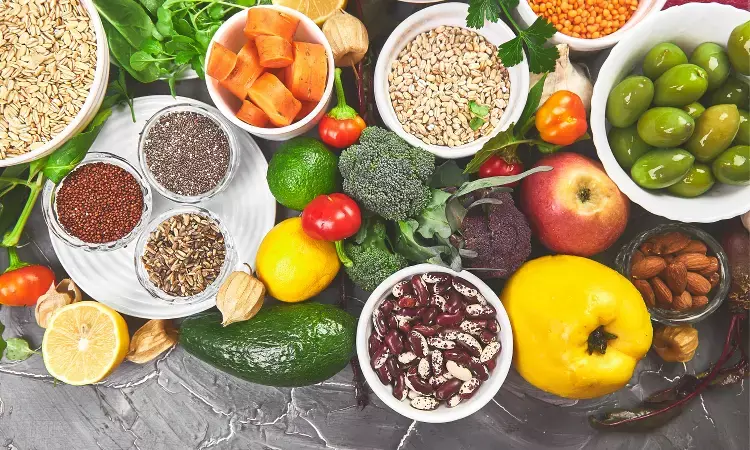- Home
- Medical news & Guidelines
- Anesthesiology
- Cardiology and CTVS
- Critical Care
- Dentistry
- Dermatology
- Diabetes and Endocrinology
- ENT
- Gastroenterology
- Medicine
- Nephrology
- Neurology
- Obstretics-Gynaecology
- Oncology
- Ophthalmology
- Orthopaedics
- Pediatrics-Neonatology
- Psychiatry
- Pulmonology
- Radiology
- Surgery
- Urology
- Laboratory Medicine
- Diet
- Nursing
- Paramedical
- Physiotherapy
- Health news
- Fact Check
- Bone Health Fact Check
- Brain Health Fact Check
- Cancer Related Fact Check
- Child Care Fact Check
- Dental and oral health fact check
- Diabetes and metabolic health fact check
- Diet and Nutrition Fact Check
- Eye and ENT Care Fact Check
- Fitness fact check
- Gut health fact check
- Heart health fact check
- Kidney health fact check
- Medical education fact check
- Men's health fact check
- Respiratory fact check
- Skin and hair care fact check
- Vaccine and Immunization fact check
- Women's health fact check
- AYUSH
- State News
- Andaman and Nicobar Islands
- Andhra Pradesh
- Arunachal Pradesh
- Assam
- Bihar
- Chandigarh
- Chattisgarh
- Dadra and Nagar Haveli
- Daman and Diu
- Delhi
- Goa
- Gujarat
- Haryana
- Himachal Pradesh
- Jammu & Kashmir
- Jharkhand
- Karnataka
- Kerala
- Ladakh
- Lakshadweep
- Madhya Pradesh
- Maharashtra
- Manipur
- Meghalaya
- Mizoram
- Nagaland
- Odisha
- Puducherry
- Punjab
- Rajasthan
- Sikkim
- Tamil Nadu
- Telangana
- Tripura
- Uttar Pradesh
- Uttrakhand
- West Bengal
- Medical Education
- Industry
Soy isoflavones supplementation helps fight migraine in women: BMC

A new study published in BMC Nutrition Journal suggests that supplementing with soy isoflavones may be thought of as an additional therapy for migraine-prone women in order to lessen the burden of the condition and relieve migraine symptoms.
A migraine is characterized as a severe, unilateral throbbing headache that is frequently accompanied by vomiting, nausea, photophobia, and phonophobia. Regular physical activity can make migraines worse. There is evidence in the literature linking estrogen levels to the etiology of migraine headaches. It's unknown, nevertheless, how soy isoflavones affect migraine symptoms. In this study, Maedeh Babapour and colleagues sought to determine how soy isoflavones affect migraine symptoms and calcitonin gene-related peptide (CGRP) levels in migraine-prone females.
83 people who were given 50 mg of soy isoflavones or a placebo every day for eight weeks underwent a randomized double-blind controlled experiment. At the beginning and completion of the intervention, serum CGRP levels were assessed along with migraine severity, migraine days per month, frequency, and length of episodes. Intention-to-treat (ITT) and bivariate comparison were employed for analysis.
The key findings of this study were as follows:
1. When compared to the placebo group, soy isoflavone consumption significantly reduced the mean frequency, length of migraine episodes, and CGRP level (-12.18 ng/l vs -8.62, P = 0.002).
2. Additionally, a substantial improvement in quality of life was discovered.
3. However, there was no statistically significant difference in the severity of the migraines or the patients' mental state (P > 0.05).
To conclude the findings of this study researchers stated that, in migraine sufferers, soy isoflavones have been shown to considerably reduce the symptoms of migraine attacks, such as headache, frequency, and duration, as well as clinical markers including MI, HDR, and MHIS. At the conclusion of the trial, CGRP levels and quality of life also increased. Depression, stress, and anxiety-related mental status measures, however, were unaffected. These results will eventually need to be confirmed by other research.
Reference: Babapour, M., Khorvash, F., Rouhani, M.H. et al. Effect of soy isoflavones supplementation on migraine characteristics, mental status and calcitonin gene-related peptide (CGRP) levels in women with migraine: results of randomised controlled trial. Nutr J 21, 50 (2022). https://doi.org/10.1186/s12937-022-00802-z
Neuroscience Masters graduate
Jacinthlyn Sylvia, a Neuroscience Master's graduate from Chennai has worked extensively in deciphering the neurobiology of cognition and motor control in aging. She also has spread-out exposure to Neurosurgery from her Bachelor’s. She is currently involved in active Neuro-Oncology research. She is an upcoming neuroscientist with a fiery passion for writing. Her news cover at Medical Dialogues feature recent discoveries and updates from the healthcare and biomedical research fields. She can be reached at editorial@medicaldialogues.in
Dr Kamal Kant Kohli-MBBS, DTCD- a chest specialist with more than 30 years of practice and a flair for writing clinical articles, Dr Kamal Kant Kohli joined Medical Dialogues as a Chief Editor of Medical News. Besides writing articles, as an editor, he proofreads and verifies all the medical content published on Medical Dialogues including those coming from journals, studies,medical conferences,guidelines etc. Email: drkohli@medicaldialogues.in. Contact no. 011-43720751


